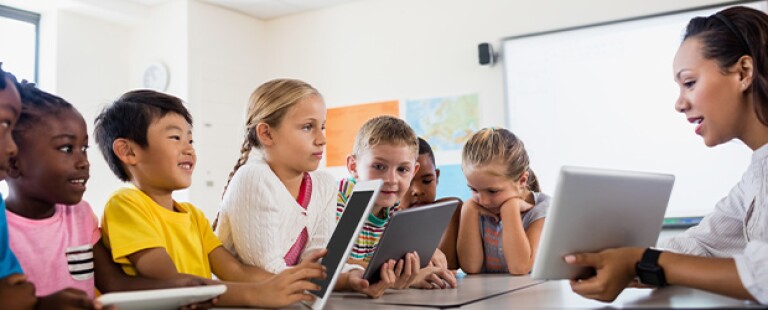Master Primary Science Concepts with Quality Tuition in Singapore
Master Primary Science Concepts with Quality Tuition in Singapore
Blog Article
Exploring the Various Teaching Approaches in Key Science Education And Learning Today
Inquiry-based knowing, hands-on experiments, and the combination of technology are redefining how educators engage young minds. Additionally, collective methods and set apart guideline are being used to cater to the diverse needs of pupils, improving both interaction and understanding.
Inquiry-Based Learning
Inquiry-Based Discovering (IBL) is an instructional strategy that urges pupils to check out clinical ideas with questioning, examination, and hands-on testing. This approach emphasizes the role of pupils as active participants in their understanding, promoting vital reasoning and problem-solving skills. By involving with real-world inquiries, pupils end up being determined and curious, which enhances their understanding of scientific concepts.
In IBL, instructors act as facilitators, directing students as they browse their inquiries instead of delivering info straight. This student-centered approach enables for differentiation, fitting various discovering styles and rates. Students develop skills in formulating theories, making experiments, and analyzing information, which are important for scientific literacy.
Additionally, IBL fosters collaboration among trainees, motivating them to share searchings for and concepts. This collective inquiry advertises social skills and a sense of area within the class. The process of query encourages resilience, as pupils learn to welcome failure as a stepping rock towards understanding.
Hands-On Experiments
Hands-on experiments are a crucial part of effective science education and learning, matching the principles of inquiry-based understanding. These experiments permit trainees to involve directly with clinical ideas, fostering a much deeper understanding through experiential knowing. By manipulating products and observing results, young students can grasp abstract concepts in tangible means.
Such activities promote vital reasoning and analytical abilities, as trainees hypothesize end results, conduct experiments, and assess outcomes. This procedure motivates them to ask inquiries, improve their understanding, and create a scientific frame of mind. Hands-on experiments can be tailored to diverse knowing designs, making certain that all students have the opportunity to involve meaningfully with the web content.
Furthermore, hands-on experiments commonly motivate cooperation among peers, promoting team effort and communication abilities. Functioning in teams makes it possible for trainees to share concepts, discuss findings, and gain from each other, which enhances their general academic experience.
Including hands-on experiments right into the primary scientific research educational program not just improves the learning setting but additionally grows a long-lasting interest in scientific research. By proactively joining their education and learning, pupils are most likely to develop a passion for clinical inquiry that expands past the class.

Modern Technology Combination
Incorporating technology right into key science education has actually ended up being progressively important in fostering student interaction and boosting discovering outcomes. The usage of electronic tools, such as interactive simulations, digital laboratories, and educational software program, supplies pupils with opportunities to check out scientific principles in innovative ways. These sources facilitate a deeper understanding of complex topics by enabling learners to visualize and control variables that would certainly be unwise in a typical class setup.
In addition, innovation integration motivates personalized learning experiences. Pupils can proceed at their own pace, reviewing tough principles via multimedia resources, which satisfy various understanding designs. This versatility not only supports private development but likewise grows a feeling of freedom in students.
Furthermore, technology serves as a bridge to real-world scientific research, attaching pupils with present research and specialist payments. Accessibility to on-line databases and scientific i thought about this journals expands students' viewpoints on scientific questions and promotes important believing skills.
Collaborative Discovering
Collective discovering plays a crucial role in main science education and learning by promoting synergy and interaction skills amongst pupils. This method encourages students to interact, share understanding, and involve in analytical, which boosts their understanding of scientific concepts. By participating in group activities, students find out to verbalize their concepts, pay attention to diverse viewpoints, and work out options, every one of which are essential skills in both real-world and academic contexts.

Study indicates that collaborative discovering can lead to raised inspiration and engagement in scientific research topics, as trainees discover enjoyment in shared experiences (primary science tuition Singapore). Furthermore, this approach prepares students for future collaborative undertakings, outfitting them with the abilities needed for efficient synergy in higher education and learning and expert environments. Inevitably, embracing collective discovering in key scientific research education can substantially enrich the discovering experience and promote a much deeper understanding of scientific query
Differentiated Guideline

Separated guideline can materialize in various means, such as differing the material, procedures, or items of knowing. For example, teachers may utilize tiered assignments that supply varying levels of complexity, permitting students to operate at their corresponding preparedness degrees. Furthermore, adaptable organizing strategies can assist in cooperation amongst students with various capacities, fostering peer knowing.
Evaluation plays an important function in this strategy, as it informs instruction and helps educators comprehend each student's one-of-a-kind requirements. Developmental evaluations, such as observations and tests, can direct teachers in adjusting their techniques to boost finding out results. primary science tuition Singapore. Eventually, by carrying out distinguished direction in main scientific research education, instructors can grow an extra efficient and equitable look these up understanding setting, empowering all trainees to reach their full possibility in understanding clinical phenomena
Conclusion
In recap, the varied mentor strategies in primary science education, including inquiry-based knowing, hands-on experiments, innovation combination, collective learning, and distinguished guideline, collectively add to a more reliable discovering setting. These techniques promote essential thinking, problem-solving abilities, and a much deeper comprehension of scientific principles. By implementing these strategies, teachers can create helpful and appealing classrooms that address the varied needs of trainees, eventually cultivating a lifelong rate of interest in science and boosting scholastic achievement.
Inquiry-Based Learning (IBL) is a pedagogical strategy that encourages pupils to check out Clicking Here scientific ideas through questioning, investigation, and hands-on trial and error.Joint knowing plays a vital role in primary science education and learning by fostering teamwork and communication abilities amongst pupils.Research study suggests that collective knowing can lead to raised motivation and interaction in scientific research subjects, as trainees find enjoyment in shared experiences.In fostering an inclusive understanding atmosphere, distinguished direction arises as a crucial technique to accommodate the varied needs and abilities of trainees in main science education. Ultimately, by applying differentiated guideline in main scientific research education and learning, educators can grow a more fair and reliable knowing atmosphere, encouraging all trainees to reach their full capacity in understanding scientific phenomena.
Report this page